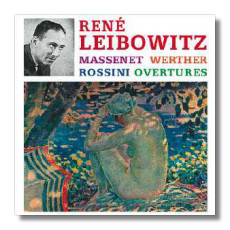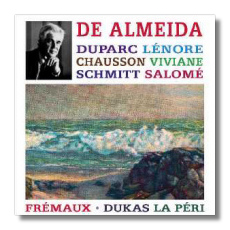
The Internet's Premier Classical Music Source
Related Links
-
Chausson Reviews
Dukas Reviews
Duparc Reviews
Massenet Reviews
Rossini Reviews
Schmitt Reviews - Latest Reviews
- More Reviews
-
By Composer
-
Collections
DVD & Blu-ray
Books
Concert Reviews
Articles/Interviews
Software
Audio
Search Amazon
Recommended Links
Site News
 CD Review
CD Review
Rediscoveries

- Gioachino Rossini:
- Overture to La Gazza Ladra
- Overture to William Tell
- Jules Massenet: Excerpts from Werther
Cesare Valletti (Werther)
Rosalind Elias (Charlotte)
Gérard Souzay (Albert)
Pasdeloup Orchestra/René Leibowitz
Rome Opera House Orchestra/René Leibowitz
ReDiscovery RD081 ADD 72:27


- Paul Dukas: La Péri
- Henri Duparc: Lénore
- Ernest Chausson: Viviane
- Florent Schmitt: La Tragédie de Salome
Monte-Carlo Opera Orchestra/Louis Frémaux
New Philharmonia Orchestra/Antonio de Almeida
ReDiscovery RD082 ADD 73:17
Many collectors treasured the RCA Victrola release on LP of these excerpts from Werther, and now here's the same recording lovingly remastered and transferred to CD. Not many Italian tenors are completely successful in the French roles, and Werther seems to be more elusive than most. (Think of all the greats who have stayed away from this role, with the exception of the aria "Pourquoi me réveiller?") Valletti's voice had a slightly nasal quality, and he made a specialty of the lyric, "juvenile" roles – Don Ottavio, Nemorino, and the like – so his Werther is definitely in the right ballpark, questionable French diction notwithstanding. I like a Charlotte with mezzo guts – Victoria de los Angeles, for example, is too wimpy for me – and Elias (a famous Carmen) sings the heck out of the "Letter Aria" and "Va! laisse couler mes larmes!" You can practically hear her being torn apart in the conflict between love and duty. In his brief appearance as Charlotte's husband, the veteran Souzay is sympathetic, although it is easy to forget that he is supposed to be only 25, and just two years older than Werther! A reel tape master has been used for this digital remastering. There is very little noise, but the climaxes – Valletti's and Elias's top notes, especially – can be a little congested. The two Rossini overtures, recorded with the Pasdeloup Orchestra, are performed in the traditional manner, but with plenty of sparkle. Here, the source material appears to have been an LP, as there is an undercurrent of groove noise in some of the quieter passages. The hero of this disc is conductor René Leibowitz, who was an irregular visitor to the recording studios. (Collectors will remember his series of Beethoven symphonies, originally released by Reader's Digest, and later reissued on CD by Chesky.) Leibowitz's personal interests seem to have centered on composers from his century, and yet his penetrating intellect did good to any music he conducted. Werther can drown in its own tears, and while Leibowitz doesn't cheat us of the score's emotions, he doesn't pull the music out of shape either. If you're unconvinced about the merits of this opera, this recording might change your mind. (Too bad that no texts and translations could be included.)
The second CD contains four works, all named after women, that used to be more popular. Who knows why they went out of fashion? Draw a hot bath, and while you're soaking in it, soak in the lush melodies, harmonies, and orchestrations of four French masters. You might need to rinse yourself off after it is all over.
Dukas's tone poem (the important prefatory Fanfare is included here too) is played by Frémaux and the Monte Carlo Orchestra. The péri is an odd combination of fairy and Norn; the tale told by Dukas's music is of an aging ruler who, having obtained the Flower of Immortality from the péri, is seduced into giving it back. (Perhaps significantly, this was the composer's last major score.) The orchestra responds to the music's tints and colors, and Frémaux balances necessary languor with forward movement. The engineering, transferred from an LP, is superb.
The remaining works come from an LP that RCA Victor released in the 1970s, I believe. I remember that it was instant must-have among knowledgeable critics of the era, and it is a mystery why it has not been transferred to CD until now. Henri Duparc is most famous for his songs, of which there are little more than a handful. Lénore is his most familiar orchestral work – which isn't saying much, because he was even less prolific in this genre. This 12-minute tone poem, based on a well-known German ballad, describes the sufferings of the eponymous lady, who is carried away on horseback by the ghost of her betrothed. Duparc was a pupil of Franck, and Lénore shows his fingerprints, as well as those of Richard Wagner. (In fact, parts of Lénore hover close to Tristan.) Viviane, an ally of Merlin, is the subject of Ernest Chausson's tone poem. Here, Massenet's influence is added to the heady Franco-Wagnerian brew. And if today's listeners know Florent Schmitt's Tragédie de Salome, it is probably because of Paul Paray's famous recording from 1958 with the Detroit Symphony Orchestra, reissued on CD in 1994. Based not on Oscar Wilde but on a poem by Robert d'Humières, Schmitt's score (which is almost contemporaneous with Richard Strauss's opera) emphasizes the Symbolist and supernatural elements of Salome's tale. Again, late French Romanticism of the richest type is predominant, and there are surprising hints of Stravinsky's Le Sacre du printemps in the culminating "Dance of Fright."
Paray's recording is inferior to de Almeida's on two counts. First, the Detroit orchestra sounds weak and tentative at times compared to the New Philharmonia. Second, Paray omits the score's offstage soprano solo; De Almeida includes it, although we are not told the name of the singer. Not just in the Schmitt, but also in the Chausson and the Duparc, de Almeida and the New Philharmonia Orchestra throw caution to the winds, and play the music not just with polish, but also with all the abandon it deserves. It would be wonderful if this ReDiscovery reissue made history repeat itself by exciting the same admiration that the LP did upon its original release. Again, an LP has been used as the source for this reissue, and what was a demonstration-class LP becomes no less impressive in this digital remastering by David Gideon.
As with all ReDiscovery releases, this is a CD-R, and the packaging is minimalist, although there are annotations (on the inlay card, not in a booklet). CD-Rs will play in most machines that play CDs, although there are a few holdouts. (My first generation DVD player, for example.) If you encounter any problems, ReDiscovery will make good. These discs are available from the ReDiscovery website (www.rediscovery.us) for $15 each, which includes shipping. These are good people, and they deserve your support. Strike a blow against generic music-making and turn back the hands of time!
Copyright © 2005, Raymond Tuttle












